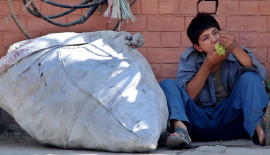
FAISALABAD: About 23% of Pakistanis are suffering from malnutrition and food insecurity despite having plenty of food grains available in the storage.
The figures were shared by University of Agriculture, Faisalabad (UAF) Vice-Chancellor Prof Iqrar Ahmad while heading an awareness walk to celebrate World Food Day arranged by the varsity’s Food, Nutrition and Home Sciences Faculty at Iqbal Auditorium on Saturday.
Sharing several reasons for the deplorable situation, he said the major ones were the lack of ability to afford nutritious food by the people, food habits, accessibility to food as well as dietary preferences.
He said while there was enough food in the country, not everyone had access to it. As per the World Food Programme, food insecurity exists even though food production is sufficient in Pakistan. Prof Iqrar said the rural population was the most affected, as many could not afford even one proper meal a day. In urban areas, he said, the situation was not encouraging as well as over 2.5 million children showed stunted growth in the cities.
“Malnutrition affects women and children the most,” he said, suggesting that feeding programmes at schools should be encouraged so that youngsters can have at least one balanced and nutritious meal a day.
Around 10 million tonnes of wheat worth Rs300 billion has been dumped in the silos of food department that can easily be distributed among the poor and needy families as an alternative option of paying cash to the vulnerable people, the UAF vice-chancellor lamented.
The cost of maize, he added, is quite low in the country and its flour can be mixed with wheat that would enrich the nutrition quality of the flour in an affordable price.
Referring to a recent report of the Planning Commission and the World Food Programme, which says that two out of every three households in Pakistan cannot afford a proper diet that, Prof Iqrar said the studies spoke volumes about the growing hunger in the country.
“We need to come up with solutions to ensure food security for all segments of the society,” he said, warning that malnutrition would increase the burden of the dependent population with stunted growth and diseases.
Prof Iqrar urged researchers to introduce viable solutions that can help limit the growing hunger and malnutrition in the country.
Malnutrition results from having insufficient nutrients in one’s diet. In Pakistan, it takes a heavy toll on the adult and child population in the form of high morbidity and mortality rates.
Apart from inadequate food intake, food insecurity and compromised water and hygiene systems, one of the biggest reasons for poor health indicators in Pakistan is the lack of awareness among communities regarding malnutrition. Malnutrition can be addressed by long-term initiatives, including food security, child protection and early childhood development programmes.
Published in The Express Tribune, October 16th, 2016.










































1713521455-0/Untitled-design-(9)1713521455-0-270x192.webp)




















COMMENTS
Comments are moderated and generally will be posted if they are on-topic and not abusive.
For more information, please see our Comments FAQ